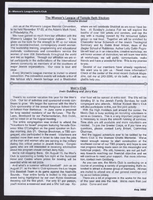Search the Special Collections and Archives Portal
Search Results

Olivia Díaz oral history interview: transcripts
Date
Archival Collection
Description
Oral history interviews with Olivia Díaz conducted by Nathalie Martinez and Barbara Tabach on August 31 and September 14, 2020 for the Latinx Voices of Southern Nevada Oral History Project. In the first interview, Díaz gives her family and personal history, growing up in Las Vegas but often visiting her family in Durango, Mexico for extended stays. She recalls her matriarchal upbringing, particularly while living in Mexico, and what life was like growing up and going to school in East Las Vegas and at the University of Nevada Las Vegas (UNLV). Subjects discussed include: Mexico; Latina identity. In the second interview, Díaz talks about her English language education career for the Clark County School District (CCSD) and the events that led her to run for Nevada Assembly and Las Vegas City Council. She is presently Nevada's Assemblywoman for District 11 and Las Vegas' Councilwoman for Ward 3. Olivia concludes her interview with insights into her political and educational goals for the community and the initiatives she has focused on in light of the COVID-19 pandemic.
Text
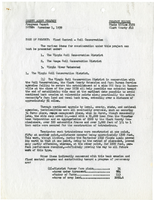
County agent project progress report, Flood control - soil conservation, November 1, 1939
Date
Archival Collection
Description
Report on flood control efforts in the Virgin Soil Conservation District, the Moapa Soil Conservation District, and the Virgin River Watershed. Project Number: State Office #172, Clark Co. #12
Text

Meeting minutes for Consolidated Student Senate University of Nevada, Las Vegas, September 9, 1996
Date
Archival Collection
Description
Text
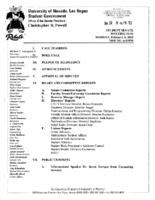
Meeting minutes for Consolidated Student Senate, University of Nevada, Las Vegas, February 03, 2003
Date
Archival Collection
Description
Text
Carlos Gomez (Latin Chamber of Commerce) oral history interview conducted by Elia Del Carmen Solano-Patricio: transcript
Date
Archival Collection
Description
From the Lincy Institute "Perspectives from the COVID-19 Pandemic" Oral History Project (MS-01178) -- Business interviews file.
Text

Luis F. Valera interview, January 23, 2019: transcript
Date
Archival Collection
Description
Interviewed by Nathalie Martinez. Laurents Bañuelos-Benitez also participates in the questioning. Luis F. Valera serves as the Vice President of Government Affairs at UNLV. His heritage is from Venezuela and Cuba. He has served as the Chairman of the Latin Chamber of Commerce and has been an active member of the Latino community since his pursuing his undergraduate degree at UNLV in Political Science and his Juris Doctorate degree from the William S. Boyd School of Law. His various achievements in the community and nation led him to become recognized and awarded the Arturo Cambeiro Hispanic of the Year Award in 2011.
Text

Transcript of interview with Todd Jones by Claytee White, January 7, 2010
Date
Archival Collection
Description
In 1991, Todd Jones arrived in Las Vegas to become a professor of philosophy at University of Nevada Las Vegas. He immediately liked the John S. Park neighborhood, where he had friends—members of a poetry group and other professors. He was attracted to the vintage esthetics and the feel of streets lined with large trees. It was a contrast with the explosion of homes being built in the city during the 1990s. Todd knew if ever bought a house, it would be there. In 2000 he did. He describes his impressions of the neighborhood's history as an old Mormon area. He also classifies the residents as being members of what her describes as three or four very distinct populations: "urban professionals, old Mormons, professors and lots of immigrants from Mexico. Todd talks about the neighborhood website that once existed and his impression of the political leanings of residents. At one point he worked as a Democrat precinct captain.
Text
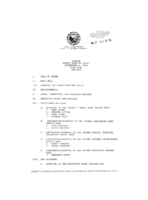
Meeting minutes for Consolidated Student Senate University of Nevada, Las Vegas, September 6, 1990
Date
Archival Collection
Description
Text
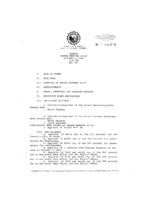
Meeting minutes for Consolidated Student Senate University of Nevada, Las Vegas, October 4, 1990
Date
Archival Collection
Description
Text

